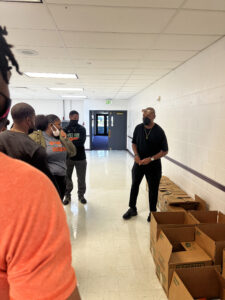
Photo courtesy Jalynn McDuffy
When many picture Florida A&M University, they see Lee Hall, the rattler statue or even
President Larry Robinson, but many picture Kyle Harris.
Harris, a native of Blakely, Ga., has been familiar with FAMU since he was a child. Following in
the footsteps of his family members he attended the prestigious university and became a
teaching assistant in 2010 after receiving a doctorate in African American history.
Despite not being a Tallahassee native, Harris found a home at FAMU, as he recalled, “While
working as a graduate assistant in various academic offices in Tucker Hall, the administrative
assistants, faculty and administrators, not only freely provided sound academic wisdom and
advice, they also voluntarily gave me hot, delicious meals, rides home, instructional materials
and monetary gifts.”
The kindness and security Harris found in FAMU’s faculty led him to become an African
American history professor to build the historically Black college’s pride and strength through
educating its students.
In Harris’ course students read FAMU alumni Ibram X. Kendi’s book, “Stamped from the
Beginning,” which illustrates the origins and remnants of racism in America. While doing so,
students are asked to participate in local politics and exercise their right to vote while learning
about poll taxes and literacy tests. Students also learn about the Black Panther Party’s efforts to
create food pantries for the less fortunate while making Thanksgiving baskets.
Taylor Kendrick, a second-year broadcast journalism student, still sings Harris’ praises as the
best teacher he had during his first year in college. “He tries to relate the material to his own
personal experiences. He teaches us history, but brings it into the present day.”
Harris is semi-famous on campus, being known as the eccentric, loud professor who runs
around his classroom as he teaches. The exciting and engaging Harris makes his students laugh,
lets them share their own experiences and even tells his own stories to create a comfortable
environment for every student despite race or origin.
Yet Harris’ impact does not solely lie in his course material but his care towards his students
and the south side of Tallahassee where the school resides. Harris believes that FAMU impacts
the south side.
“It is a proven fact that Black upward mobility is significantly higher in areas within a 50-mile
radius of HBCUs,” he said.
Harris’ efforts to be a part of that upward mobility has impacted those who witness it. Tariah
Mosley, a south side native, attends the class and witnesses this.
“Some families on the south side have it harder than families on the north side. It’s not all
about an image of giving back it’s the thought and having heart of giving back to those who
aren’t as fortunate as you,” he said.
Harris’ teaching not only educates students on the impact of Black leaders but pushes them to
become leaders in their own right and practice what he preaches. An active community servant,
Harris believes that service is an active part of the learning process.
“Some people consider Black history in the classroom only theory. One must go into the
community to experience it. We read and discuss various source material concerning challenges
in the United States which have led to disproportionate and institutionalized systems of racism,
mass incarceration and generational poverty in Black and Hispanic communities. The
[community service efforts] gives my students an opportunity to actively combat oppressive
systems, like poverty,” Harris said.
His acts in the community are recognized by his students.
As Harris impacts his community and students through teaching and service with a large smile
and open arms, the community and his students can find comfort in the material despite
learning about their own disadvantages. As Harris teaches about years and years of Black
oppression and pain, he brings light to a dark situation and empowers his students to believe a
change is going to come, and they can be that change.
“I want every student to be able to understand, apply, analyze and evaluate source material on
this nation, most particularly as it relates to the Black experience, from a diasporic perspective,
in order to create safe spaces for historically underserved populations to thrive,” he said.
Working to uplift underserved communities, Kyle Harris uplifts his students and the name of
Florida A&M University and creates student leaders who can advance the school and their
communities forward.